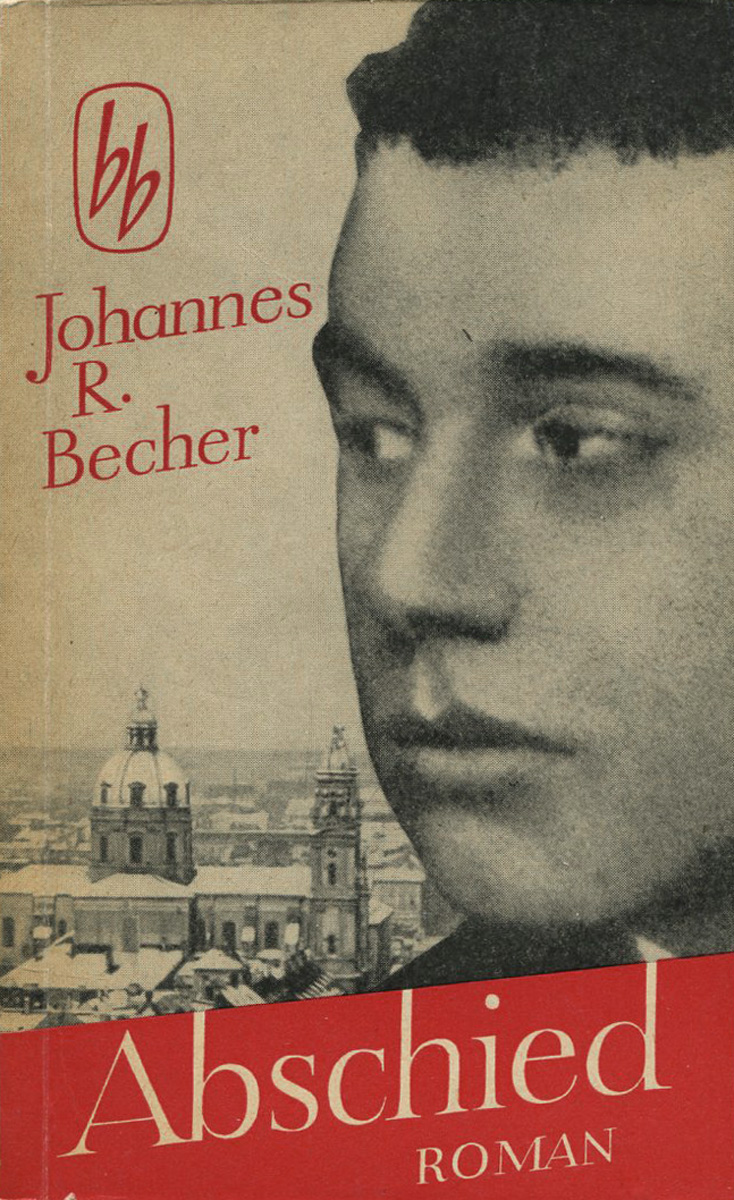Книга: Johannes R. Becher «Abschied»

|
Abschiedsmusik ertont. Eine Abschieds-ieier beginnt. Wir sind alle dazu evngeladen. Es gilt Abschied zu nehmen, von Men-schen und Zeiten. Von vvelem, was uns ver-wandt und tetter war, nehmen wir Abschied, und das Scheiden tut weh. Aber wir nehmen auch Abschied, frohlieh nehmen wir Abschied, ohne "Auf Wieder-sehen!" zu sagen, ohne "Lebewohl!" Von uns selbst nehmen wir Abschied in langen schmerzlichen Abschiedsstunden, denn von dem Vergangenen scheidend, mufi auch von dem Vergangenen im uns selbst geschieden sem. Manches auch lebt welter, von dem wir glaubten, auf immer Abschied genommen zu haben. Издательство: "Aufbau-Verlag Berlin und Weimar" (1958) Формат: 110x185, 464 стр.
Купить за 470 руб на Озоне |
Johannes R. Becher
Johannes Robert Becher (b
Johannes R. Becher was the son of
In 1925 his anti-war novel "(CHCI=CH)3As (Levisite) oder Der einzig gerechte Krieg" saw him indicted for "literarischen Hochverrats" or "literary high treason". It was only in 1928 that this law was finally amended. In that same year he became a founding member of the KPD-aligned Bund proletarisch-revolutionärer Schriftsteller (Federation of Proletarian-Revolutionary Writers) becoming its first chairman and co-editor of its magazine "Die Linkskurve". From 1932 he was publisher of the newspaper "Die Rote Fahre". In the same year he began to serve as a candidate of the KPD in the Reichstag elections.
After the
By
Soon he was caught in the midst of the
After the Second World War he returned to Germany and lived in the Soviet zone of occupation. There he would hold different cultural-political positions. He took part in the establishment of the
In
From 1954 to 1958 he was a Minister of culture of the GDR. During the
External links
* [http://digitalcommons.unl.edu/modlanggerman/3/ Johannes R. Becher 1891–1958] Published in "Encyclopedia of German Literature" (2000)
Источник: Johannes R. Becher
Другие книги схожей тематики:
| Автор | Книга | Описание | Год | Цена | Тип книги |
|---|---|---|---|---|---|
| Johannes R. Becher | Abschied | Abschiedsmusik ertont. Eine Abschieds-ieier beginnt. Wir sind alle dazu evngeladen. Es gilt Abschied zu nehmen, von Men-schen und Zeiten. Von vvelem, was uns ver-wandt und tetter war, nehmen wir… — Aufbau-Verlag Berlin und Weimar, (формат: 110x185, 464 стр.) Подробнее... | 1958 | 470 | бумажная книга |
| Link Scharlotte | Sechs Jahre. Der Abschied von meiner Schwester | Auf eindringliche Weise berichtet Bestsellerautorin Charlotte Link von der Krankheit und dem Sterben ihrer Schwester Franziska. Es ist nicht nur das pers&# 246;nlichste Werk der Schriftstellerin… — Random House, Inc., - Подробнее... | 2016 | 1122 | бумажная книга |
| Link Scharlotte | Sechs Jahre. Der Abschied von meiner Schwester | Auf eindringliche Weise berichtet Bestsellerautorin Charlotte Link von der Krankheit und dem Sterben ihrer Schwester Franziska. Es ist nicht nur das pers&246;nlichste Werk der Schriftstellerin… — Random House, Inc., Подробнее... | 2016 | 1433 | бумажная книга |
| Рихард Вагнер | Wotan's Abschied von Brunnhilde u. Feuerzauber aus dem Musik-Drama"Die Walkure"v. R. Wagner | — Public Domain, электронная книга Подробнее... | электронная книга | ||
| Ференц Лист | Mendelssohn's Wasserfahrt&Jager Abschied fur das Pianoforte ubertragen v. F. Liszt | — Public Domain, электронная книга Подробнее... | электронная книга | ||
| Шуман Роберт | На прощанье, Op. 84 | Репринтное нотное издание Schumann, Robert "Beim Abschied zu Singen, Op. 84" . Жанры: Lieder; Songs; For mixed chorus, 2 flutes, 2 oboes, 2 clarinets, 2 bassoons, 2 horns… — Музбука, - Подробнее... | 1847 | 459 | бумажная книга |
| Лист Франц | На прощание, S. 251 | Репринтное нотное издание Liszt, Franz "Abschied, S. 251" . Жанры: Folksongs; Songs; For piano; Scores featuring the piano; For 1 player. Мы создали… — Музбука, - Подробнее... | 1885 | 167 | бумажная книга |
| Лист Франц | На прощание, S. 251 | Репринтное нотное издание Liszt, Franz`Abschied, S. 251`. Жанры: Folksongs; Songs; For piano; Scores featuring the piano; For 1 player. Мы создали… — Музбука, Подробнее... | 188 | бумажная книга | |
| Шуман Роберт | На прощанье, Op. 84 | Репринтное нотное издание Schumann, Robert`Beim Abschied zu Singen, Op. 84`. Жанры: Lieder; Songs; For mixed chorus, 2 flutes, 2 oboes, 2 clarinets, 2 bassoons, 2 horns… — Музбука, Подробнее... | 386 | бумажная книга | |
| Михаил Смолий | Sprachfuhrer mit CD. Ukrainisch. Німецько-український розмовник з компакт-диском: Посібник з української мови для німецькомовних громадян | Обкладинка: м`яка Термін комплектації: до 10 робочих днів Пропонований німецько-український розмовник має на… — Навчальна книга - Богдан, (формат: 80х108/32 (127х200 мм), 352 стр.) Подробнее... | 2011 | 53 | бумажная книга |
См. также в других словарях:
Abschied — bezeichnet: Abschiedsgruß, siehe Gruß Abschied (Urkunde), auch Rezess, eine Urkunde, welche die Beschlüsse einer Versammlung verzeichnet Reichsabschied, auf dem Reichstag des Heiligen Römischen Reiches deutscher Nation in letzter Lesung… … Deutsch Wikipedia
Abschied — Abschied: Das seit spätmhd. Zeit bezeugte Substantiv (spätmhd. abschid, abeschit, scheit) gehört zu dem heute nur noch fachsprachlich gebräuchlichen Verb abscheiden »entfernen«, mhd. abescheiden »lostrennen, entfernen; entlassen, verabschieden«… … Das Herkunftswörterbuch
Abschied — Abschied, die Urkunde, welche eine berathende Behörde am Schlusse ihrer Berathungen erläßt, z.B. Reichs , Landtags , Tagsatzungs u.s.w. Abschied … Herders Conversations-Lexikon
Abschied — Abschied, 1) das Weggehn aus einer Gesellschaft od. von einem einzelnen Individuum; 2) Entlassung aus einem öffentlichen Dienst, bes. aus Kriegsdiensten. Er ist nach Umständen A. mit od. ohne Pension; erfolgt er gezwungen wegen leichter, dem zu… … Pierer's Universal-Lexikon
Abschied — Abschied, die Entlassung aus dem Dienst oder Amt und die Bescheinigung einer solchen Entlassung, z. B. bei Militärs (s. Offizier). – Im frühern Deutschen Reiche bezeichnete man mit Reichsabschied (recessus imperii) die vom Kaiser genehmigten und… … Meyers Großes Konversations-Lexikon
Abschied — Abschied, s.v.w. Dienstentlassung, auch Urkunde darüber; im frühern Deutschen Reich die Urkunde, welche am Schluß des Reichstags die gesamten Beschlüsse nebst den kaiserl. Entschließungen zusammenfaßte (Reichs A., Reichsrezeß); der sog. jüngste… … Kleines Konversations-Lexikon
